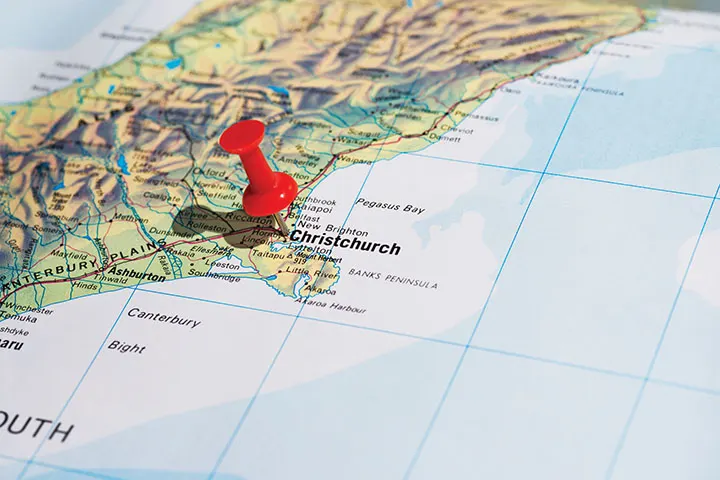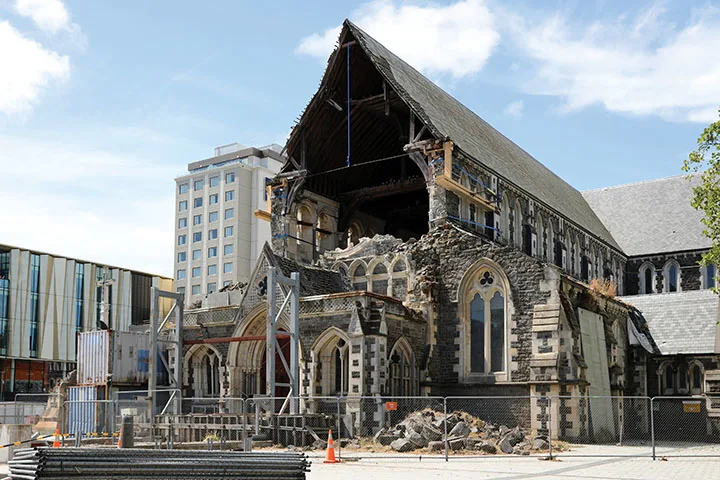Unprecedented Times. Unprecedented Service.
Written By: Larry Stevens

As a country, we have just been through and, in many ways, are still going through one of the most difficult periods in my entire memory. We have seen natural disasters, economic downturns, wars, terrorism, and all manner of national and worldwide emergencies. In most cases, much of the population seems to have the luxury of witnessing these events only through the lens of print or broadcast media. Rarely is a high percentage of the population directly involved in these difficult situations. Occasionally we know someone personally who is directly impacted, but for the most part, the scary and worrisome events in our country and in the world leave most of us only to witness from afar. Certainly, we become concerned; we may step up our efforts to be better prepared; we may become more compassionate in reaching out and helping others. We may even be caused to worry about the long term impact of what is happening. But the direct impact usually affects only a relative few of us.
During a recent trip to New Zealand at the beginning of this year, I had a short visit to Christchurch, which you may remember suffered a violent 6.3 magnitude earthquake in February of 2011. The earthquake, which was centered almost in the heart of the downtown area, virtually destroyed the city, leveled many of the beautiful historic landmarks, and killed 185 people. This earthquake was of special interest to me at the time because I had lived in Christchurch for six months back in 1966. The city has always held a special place in my heart. Notwithstanding my particular interest in the city and the event, I, like most of us, experienced it only through the news coverage, and very soon as other events flooded in, the Christchurch earthquake gradually disappeared from my daily thoughts and concerns.
During my recent visit, however, I was surprised to learn that the city has still not fully recovered. There remain sections of the city center that are not yet fully accessible. Large plots of land are fenced off and unavailable due to structural damage that has not yet been addressed. The beautiful cathedral, which was the focal point of the center of the city, still lies in ruins. The most poignant discovery, however, was in the minds and hearts of the people. Most of the people that I spoke with seemed now to recall time based on a pre- and post-earthquake perspective.


I had the opportunity to get to know one young lady who, at the time, was working in a restaurant while attending college as a nursing student. Her husband worked for the fire department as a paramedic when the quake struck. Tia was not injured herself, but because of her background and training, she immediately began to offer aid to those in her restaurant and others around her who had been injured. She had the experience of having some of her co-workers literally die in her arms. Following the aftermath of the emergency and dealing with the immediate issues, she returned to her home to find it completely destroyed. I had the opportunity to speak at length with her and came to know the profound impact the whole experience had on her life and how, to this day, it has changed her perspective and outlook.
Unlike other national or world emergencies, the pandemic of the COVID-19 outbreak has had a very direct impact on each one of us. Relatively few of us have actually contracted the virus, but literally every one of us has had our lives interrupted, and our daily habits altered significantly because of this threat. How this will impact us in the future and how long the impact will last is still unknown. We are all still trying to get clarity on that aspect of the current situation. Will we ever be able to get back to normal? How long will the economic collapse that has been imposed upon us last, and what will the expected recovery look like? As importantly, what will we do to prevent this from happening again in the future, or how can we be better prepared?
Med One has been impacted for sure. The lives of our employees and many of our normal operations have been significantly impacted. However, from a purely business standpoint, it has been a remarkably busy and productive time for us. Our leasing activity is very, very busy as hospitals reach out for our help in acquiring new equipment that is needed in their long-term planning. Our leasing activity has been more robust through the first two quarters of 2020 than it has been for several years.
"We feel fortunate that we serve an industry that has needed our services during a very scary and uncertain time."Hospitals with temporary or short-term needs have literally run our rental equipment inventories almost to zero. We’ve never seen a time when our rental employees have had to be so busy for so long in order to serve the requests of our customers. We have run out of certain types of equipment, of which we never thought we would run short. Through the first and second quarters of this year, we have had to create waiting lists in order to prioritize deliveries. Our delivery personnel have had to take extra precautions, the hospitals that they deliver to have had to take extra precautions, and those getting the equipment ready for delivery have had to be extra careful in following new protocols for cleaning and servicing. Our biomed service employees have been working overtime and weekends in order to keep up with the increased demand. Obviously, we have not even had to consider whether we have to furlough any of our employees. Because we are considered an essential business that serves the medical community, we have been running on all cylinders since before the beginning of the year.
For the company and for our employees, this has been a financial blessing. A financially healthy Med One has been able to relieve any present concerns that our employees might otherwise have had regarding the viability of their employment and their ability to care for their families during the stressful time that we have seen.
While we have seen so many others around us struggling with major financial stress, we have been busier than we have ever been. This has been, on the one hand, very gratifying yet, on the other hand, almost embarrassing when viewed through the lens of what others are going through. We feel fortunate that we serve an industry that has needed our services during a very scary and uncertain time. We also feel very gratified that we have been able to manage the company’s financial situation and that we are in our present condition.
I recently heard the following story recounted by a physician regarding one of his patients. The underlying message in this story resonated with me and our situation at Med One.
“In 1987, I became acquainted with a remarkable man who needed a heart transplant. Tom was 63 years old. Following military service during World War II, he married and settled down in Utah. He became an energetic and successful brick mason. In later years he especially enjoyed working with his oldest grandchild, Jonathan, during school vacations. The two developed a special bond, in part because Tom saw much of himself in Jonathan.
Tom found waiting for a donor heart frustrating. He was not a particularly patient man. He had always been able to set and achieve goals through hard work and sheer determination. Struggling with heart failure, with his life on hold, Tom sometimes asked me what I was doing to speed up the process. Jokingly, he suggested avenues I could pursue that would make a donor heart available to him sooner.
One joyous yet dreadful day, an ideal donor heart became available for Tom. The size and blood type were a match, and the donor was young, just 16 years old. The donor heart belonged to Jonathan, Tom’s beloved grandson. Earlier that day, Jonathan had been fatally injured when the car in which he was riding was struck by a passing train.
"We are constantly reminding ourselves that now is the time for us to show the kind of service to our customers that will not only be appreciated but long remembered."When I visited Tom and his wife in the hospital, they were distraught. It is hard to imagine what they were going through, knowing that Tom’s life could be extended by using their grandson’s heart. At first, they refused to consider the proffered heart from Jonathan’s grieving parents, their daughter and son-in-law. Tom and his wife knew, though, that Jonathan was brain dead, and came to understand that their prayers for a donor heart for Tom had not caused Jonathan’s accident. No, Jonathan’s heart was a gift that could bless Tom in his time of need. They recognized that something good might come out of this tragedy and decided to proceed.
The transplant procedures went well. Afterward, Tom was a different man. The change went beyond improved health or even gratitude. He told me that he reflected every morning on Jonathan, on his daughter and son-in-law, on the gift he had received, and on what that gift had entailed. Even though his innate good humor and grit were still readily apparent, I observed that Tom was more solemn, thoughtful, and kindhearted.
Tom lived an additional 13 years after the transplant, years he otherwise would not have had. His obituary stated that these years allowed him to touch the lives of his family and others with generosity and love. He was a private benefactor and an example of optimism and determination.”
We at Med One, like Tom, are humbled by the situation we now find ourselves in, prospering in the midst of so much hardship. Despite the circumstances of this terrible time, we have benefitted greatly simply due to the nature of our business and due to the nature of the national emergency. We appreciate the opportunity we have to serve hospitals around the country and, like Tom, are similarly committed to paying it forward in the years to come.
At Med One, we have been very introspective in not wanting to seem to be taking advantage of the nation being in crisis while we seem to be “getting fat." We have continued to be mindful of our responsibility to really serve our customers at the highest level and to always give them a fair value at a fair price. We are constantly reminding ourselves that now is the time for us to show the kind of service to our customers that will not only be appreciated but long remembered. Trying to serve our customers during this uncommon period in our nation’s history has certainly caused each person who is responsible for charting Med One’s future course to be reflective and grateful for what we have. We must be continually vigilant to be always aware that many people have had to sacrifice a great deal during a time when things have been very good for us.
What will the future hold? I wish we knew as much about what is yet to come as we do about what we have just been through. At this time a year ago, we could have never predicted the kind of environment we would be in as we ushered in the decade of the 2020’s. It is our hope that:
- The nation’s financial recovery will be rapid and strong.
- Our local small businesses will be able to recover quickly and once again be able to serve our communities with their services.
- People will be able to get back to work and become productive.
- We can put the feeling of fear behind us as we aggressively move forward.
To our employees and business partners who have helped us get through this very critical time, we express our heartfelt thanks and gratitude. We feel that the events, surprises, and challenges of the first two quarters of 2020 have changed much about how we think and how we will approach life in the future.
Source:
Renlund, Dale G. "Consider the Goodness and Greatness of God." 4 Apr. 2020 Address.
